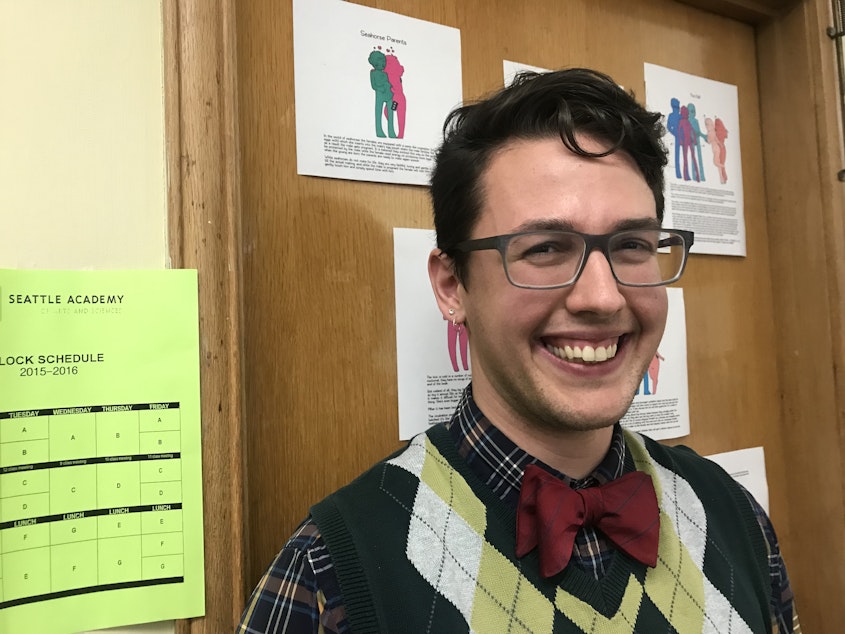How one transgender teacher came out to his students

Lewis Maday-Travis looks like the cool teacher every kid hopes to have. He’s 28 years old, with ear piercings, a geek-chic bow tie, and an easy grin.
Maday-Travis teaches middle-school biology at Seattle Academy of Arts and Sciences, a private school on Capitol Hill.
"I love spending time with kids at a moment when they are really figuring out, perhaps for the first time, who they are as individuals, and sort of unmasking parts of their own identity," he said. "I know that that was a really important thing that I did with my teachers in middle school and high school."
Maday-Travis was classified as female at birth. In middle school, he figured he was a lesbian. It wasn't until high school that he started questioning his gender.
"I didn't really have a lot of language about what being trans might look like. I didn't have role models. I hadn't really encountered it very much."
Sponsored
In college, he decided that a male identity fit best.
Not long after, in 2012, Maday-Travis came to work at Seattle Academy.
"Most faculty were aware that I was trans, because as an accident of the interview process, I was being interviewed as a female candidate for this job — and I was like, 'Alright, so here's the thing.'"
His colleagues were welcoming. But he was still nervous about how students and parents would react to a transgender teacher. "Trans" wasn’t a household word yet. That's changed over the past few years, as transgender characters have appeared in TV shows, and celebrities have come out as trans.
Two years ago, Maday-Travis started teaching his sixth-graders a unit about how certain groups of people are marginalized in science — like people of color and those with disabilities — and how that changes how science is researched and who is considered.
Sponsored
"As I was opening that unit, I thought that was a really appropriate time for me to talk about my experience as a trans person in science — talking about what it was like when I was perceived as a woman teaching science, or a woman doing science in the lab, compared to my experiences now, as a man."
It felt like the right time to come out to his students.
"I definitely was nervous, especially the first time," he said. "I was teaching five classes that time, so I got to do it five times in a row. And yeah, the first time I did, I was just like, what's going to happen?"
Maday-Travis told his story. Then he asked the students if they had questions.
"And this kid in the back row pops up his hand really enthusiastically, and I'm like, okay, like, what's this going to be about? And I call on him and he says, 'How did you get your beard?'"
Sponsored
It’s a pressing question in sixth grade.
Maday-Travis was relieved by how nonchalant his students were. Parents have been supportive, too.
He said being out as trans helps him be a better biology teacher.
"Oftentimes, students come into a science classroom, in particular, expecting things to be very black and white, very binary," he said.
Maday-Travis shows his students examples from the animal world that illustrate what’s actually a huge diversity of gender norms and reproductive practices.
Sponsored
"And so it's really exciting to be a science teacher who is able to show all of those examples, including examples that reflect situations where the majority of a population has different sex couplings who are raising young together. And also examples where there is just wacky and wild things happening."
Maday-Travis also teaches human anatomy and sex ed. While a lot of schools have prescribed lessons for those subjects, at his private school, teachers are in charge of the curriculum.
"It's a gift to not be teaching from a textbook," he said. "I have never seen a respectful, and, like, a truly inclusive approach to bodies like mine in a textbook."
Maday-Travis said he thinks this approach to science makes the school a more welcoming place for all of his students — and for him, too.
"I was worried when I first came out as trans that somehow I had overstepped a boundary that was not professional, or that wouldn't be accepted by the community," he said. "But in reality, I found that the ways that it has allowed me to be my authentic self have made me a better teacher."

